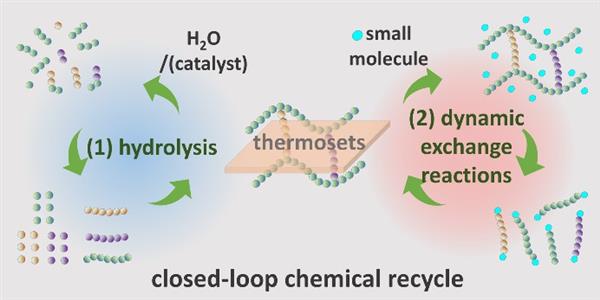97. (Green. Chem.) Closed-loop chemical recycling of thermosetting polymers and their applications: a review
作者:Yanlin Liu,# Zhen Yu,# Binbo Wang, Pengyun Li, Jin Zhu, Songqi Ma*
关键字:热固性树脂,闭环回收,水解,动态交换
论文来源:期刊
具体来源:Green Chemistry
发表时间:2022年
Conventional thermosets are infusible and insoluble covalently cross-linked polymers that are difficult to recycle and reuse when discarded. Recent years have witnessed the development of the closed-loop recycling of novel thermosets as well as their applications in composites, 3D printing materials, etc. through innovations in degradation techniques and reversible chemistries (or dynamic chemistries). In this review, the approaches for achieving the closed-loop recycling of novel thermosets and their downstream materials are divided into two categories. One is to hydrolyze the thermosets in an acidic, alkaline or catalyst solution, and then recover the monomers or oligomers, which can be reused to prepare thermosets or their functional materials. Another is to de-cross-link and re-cross-link the thermosets through the exchange reaction of dynamic bonds. In recent years, various cleavable (or dynamic) bonds such as ester bonds, acetal linkages, Schiff bases, disulfide bonds, hexahydrotriazine structures, boronic ester bonds, and so on have been developed for the preparation of closed-loop recyclable thermosets, and their closed-loop recycling mechanisms have also been fully demonstrated. By adopting the strategy of closed-loop recycling through hydrolysis, the recovered thermosets have the same structure and properties as those of the original resin. However, the degradation process strongly depends on the wettabilty of the resin, the pH of the solution or the catalyst, and how to improve monomer recovery (whether it can reach ~100%) remains a challenge. When the thermosets are closed-loop recycled through a dynamic reaction, the recovery rate is ideally 100%; however, recycling must be carried out at high temperature, and the performance of the recovered resin will inevitably be poorer compared with that of the original thermosets.

论文链接:https://doi.org/10.1039/D2GC00368F